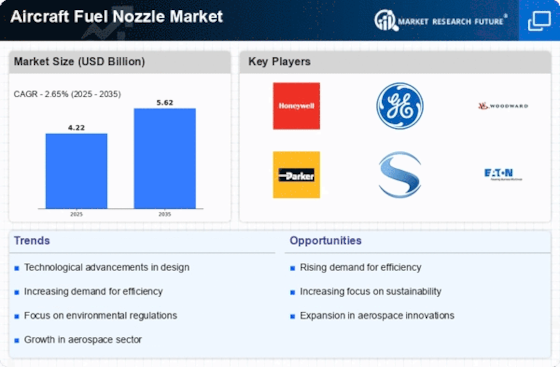Top Industry Leaders in the Aircraft Fuel Nozzle Market

Strategies Adopted:
Product Innovation: Key players focus on developing advanced fuel nozzle designs with enhanced efficiency, durability, and performance to meet the evolving demands of aircraft manufacturers and operators.
Strategic Partnerships: Collaborations with aircraft manufacturers and engine OEMs enable companies to secure long-term contracts and expand their market presence by supplying fuel nozzles for new aircraft programs.
Market Expansion: Companies pursue global expansion strategies to penetrate emerging markets and capitalize on the growing demand for commercial and military aircraft, thereby increasing their market share.
Aftermarket Services: Offering comprehensive aftermarket services, including maintenance, repair, and overhaul (MRO), allows companies to establish long-term relationships with customers and generate additional revenue streams.
Key Players:
Advanced Atomization Technologies (JV between Parker Aerospace & GE Aviation (US))
Avstar Fuel Systems, Inc. (US)
Axian Technology, Inc. (US)
Collins Aerospace (part of United Technologies Corporation (US))
GE Aviation (a part of General Electric Company (US))
General Aviation Modifications, Inc. (US)
Kelly Aerospace Inc. (US)
Parker Hannifin Corporation (US)
Precision Airmotive LLC (US)
Woodward, Inc. (US)
Factors for Market Share Analysis:
Technology Leadership: Companies with cutting-edge fuel nozzle designs and patented technologies often command a larger market share due to their ability to offer superior performance and reliability.
Customer Relationships: Strong relationships with aircraft manufacturers, engine OEMs, and airlines provide key players with a competitive advantage, as they are preferred suppliers for new aircraft programs and aftermarket services.
Regulatory Compliance: Compliance with stringent aviation regulations and certifications, such as FAA and EASA standards, is crucial for market penetration and maintaining customer trust and loyalty.
Pricing Strategy: Competitive pricing strategies, including cost-effective manufacturing processes and competitive pricing models, influence market share by attracting price-sensitive customers and winning contracts.
New and Emerging Companies:
Avio Aero (Italy)
Xona Aerospace (US)
Aerofit LLC (US)
Mecachrome (France)
PM-Motors (Russia)
Norautron (Norway)
Argon Corporation (US)
CAL International (UK)
Aerosport Inc. (Canada)
Delta Fuel Systems, Inc. (US)
Current Company Investment Trends:
Research and Development: Companies continue to invest in R&D to develop next-generation fuel nozzle technologies, improve fuel efficiency, reduce emissions, and enhance engine performance.
Manufacturing Capabilities: Investments in advanced manufacturing facilities and automation technologies aim to increase production capacity, improve quality control, and reduce manufacturing costs.
Aftermarket Services: Expansion of aftermarket service offerings, including MRO capabilities, spare parts distribution, and customer support, supports revenue diversification and customer retention efforts.
Sustainability Initiatives: Investments in sustainable manufacturing processes, eco-friendly materials, and alternative fuels align with industry trends towards environmental responsibility and carbon neutrality.
Overall Competitive Scenario:
The aircraft fuel nozzle market is characterized by intense competition among key players, driven by technological innovation, strategic partnerships, and regulatory compliance. Factors such as technology leadership, customer relationships, pricing strategy, and regulatory compliance influence market share dynamics. New and emerging companies contribute to market competitiveness through innovation and disruptive technologies. Industry news and investment trends reflect ongoing developments in technology, market expansion, and sustainability initiatives, shaping the overall competitive landscape of the aircraft fuel nozzle market.











